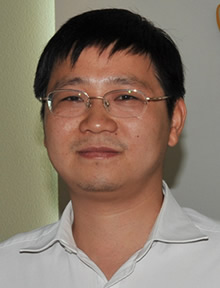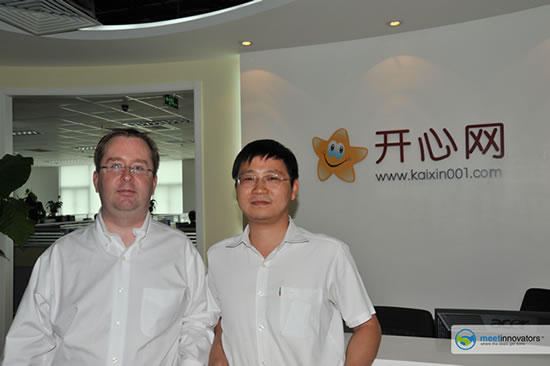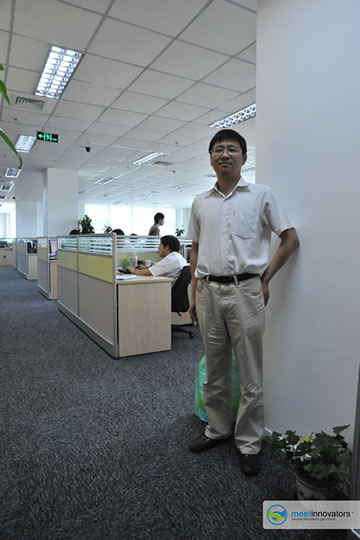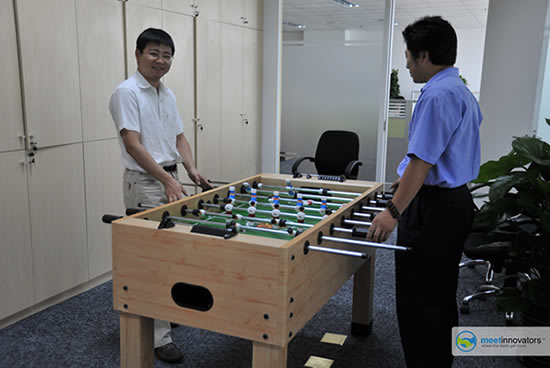
- A rare interview with China’s fastest growing social network
- Read about Kaixin001, in their first ever english language interview
- Find out how the used the telephone to grow from nothing to become one of the top social networks in barely a year
- Get a feel for how competitive copying is inside the online market in China
This interview was arranged by Georg Godula and Markus Fuhrmann from Web2Asia.com. The translation for this interview was done by Winser Zhao of http://www.Chinatravel20.com
Full Interview Audio and Transcript
Personal Info
Hobbies and Interests: Climbing.
Favourite Books: “Huangdi waijing jing” – a old Chinese medicine and philosophy book.
Favourite Entrepreneurs: Warren Buffett, Shi Yuzhu, CEO of Giant Entertainment.
Company website: http://www.kaixin001.com
Fast Track Interview
Adrian Bye: I’m here in the office of Kaixin001 in Beijing, China, with the founder who is Chi Yu and the VP of Marketing who is Liu Qian.
This is a very interesting interview. It is the first time, as far as I know, that there is an English language interview with these guys. One of the things that is very interesting in this company is that their native language is Chinese, and they don’t have to speak English.
Let’s start with the guys telling us a bit about themselves.
Chi Yu: I’m from South China and has been in Beijing for more than 18 years. I worked in Sina where I saw that SNS would have a beautiful future very quickly. I left Sina and set up the Kaixin company at the end of 2007.
Liu Qian, the VP of Marketing also worked for Sina for over 10 years. He too found that SNS in China had a good possibility, and he joined the team here at the beginning of this year.
![]() Adrian Bye: The business model for Kaixin is very interesting. It seemed that the Chinese market was very full with no need for a new social networking site. Then came Kaixin. How did you come up with the idea that this would work?
Adrian Bye: The business model for Kaixin is very interesting. It seemed that the Chinese market was very full with no need for a new social networking site. Then came Kaixin. How did you come up with the idea that this would work?
Chi Yu: First of all, we don’t believe the market is full. It is just the beginning for the social network in China. There are maybe 20 or 30 social media companies in China. Some of them we need, but the rest we do not because their business models are not good. We do believe that Kaixin will be a new concept in social networking in China.
Adrian Bye: My understanding is that Kaixin001 got started through tell-a-friend addresses. For example, people would sign up in their address book and then they invite all of their friends, and all their friends, and all their friends. Is this correct?
Chi Yu: We do use this way to invite more users for Kaixin001. The users think Kaixin001 is a good social network and then invite their friends. The system does not push them to invite more users. The users invite their friends by themselves.
Adrian Bye: What you are saying is the viral marketing is permission-based?
Chi Yu: We see it as word-of-mouth. Users also use IM, such as MSN and QQ, to invite friends. Because the users feel our website is very fun, they share with friends through IM. For example, a user tells somebody, “This website is very fun. Come here and join us.” These are all done by the users themselves typing in the IM. We do not use automated systems. We do know that some SNS companies in China email invitations to the entire user’s address book without the user’s permission.
Adrian Bye: Americans in China who use Chinese internet say to me, “Kaixin001 has so many emails, but my employees love Kaixin. They all use it.” It seems to be a very interesting difference between the West and China in the amount of email marketing you can do for a social network. Do you think that is the case?
Chi Yu: The email invitation is common in China, and some companies do a lot of work this way. We did not want to do that for our business. Instead, we used ways to develop the database of the users. For example, at the beginning, the first users of Kaixin001 called their friends via the telephone and said, "We set up a social network.”
Adrian Bye: By telephone or by call center?
 Chi Yu: All of our staff called all of our friends. They registered in Kaixin, and then they invited their friends.
Chi Yu: All of our staff called all of our friends. They registered in Kaixin, and then they invited their friends.
Adrian Bye: How many users did you get from phone calls?
Chi Yu: Maybe only several hundred. Then they informed the Sina, and Sina informed the Soho and Ala.
Adrian Bye: That is brilliant. I’ve never heard of a social networking started by telephone. That’s amazing. You guys have grown very fast. How long ago did you start?
Chi Yu: We set up the website in October 2007. Then we tested it in beta from January 2008 until March 2008 when we actually launched.
Adrian Bye: How many registered and active users do you have now?
Chi Yu: We have 38 million registrations. About one-third are active and log in everyday.
Adrian Bye: Why do you think they’re so active?
Chi Yu: The users needed this kind of service. They have not experienced this before. Most Chinese workers are hard working and need some place to release and relax, and they can find fun from Kaixin001. The online relationship between friends also involves more content than offline, so they can also build more trust online.
Adrian Bye: When we register a website in the U.S. or in English, we always make sure we get dot-com, and we get a very clear name. For us to register a domain like Kaixin001.com, we would never have a number in a name. Why did you do it this way?
Chi Yu: When we started, we did not have enough money to buy Kaixin.com. The domain name was owned by a USA domain trader, and the price was very high. We could not afford it at that time.
Adrian Bye: I haven’t used Kaixin because of the Chinese, but what I read was that Kaixin001 is a copy of Facebook, and Kaixin is a copy of Kaixin001. It’s like a big circle of copying. Is that accurate?
Chi Yu: Kaixin001 is the same as Facebook in that they are the same social network system. Kaixin001 has its own content, product and features, and the user’s experience is quite different from Facebook.
It’s okay that somebody copies Kaixin001. It’s easy to copy, but copying the name is a problem.
Adrian Bye: For us in the US, we don’t understand this level of copying within the same market. You are in the middle of very competitive market.
 Chi Yu: There are a dozen companies named Kaixin. For example, one of these other companies very rudely uses the email invitation. They copy the names and even copy the name Kaixin. It’s a type of imitation, but their content is automatically by the system. Then they send to many users at the same time. Sometimes the users then don’t understand that it is not our Kaixin service, and they become very angry.
Chi Yu: There are a dozen companies named Kaixin. For example, one of these other companies very rudely uses the email invitation. They copy the names and even copy the name Kaixin. It’s a type of imitation, but their content is automatically by the system. Then they send to many users at the same time. Sometimes the users then don’t understand that it is not our Kaixin service, and they become very angry.
Adrian Bye: It affects your brand. They were using very aggressive, non-permission based invitations while you are aggressive but permission based.
I want to talk more about the name and want to understand the reason for registering a domain Kaixin001. In English, if I want to register happy.com and I didn’t have the money to buy the domain, I would register happyday.com or happylife.com. I would then call the social network happylife. Whereas you didn’t do that. You named it Kaixin001. Is it more normal to put numbers in the domain in China?
Chi Yu: It’s common use for numbers in an URL name or domain name in China. We are the first one to use 001 in a domain name though.
Adrian Bye: It is interesting that you do things your way and don’t care about the U.S. You are showing the way for many more Chinese companies.
Chi Yu: We don’t understand the habit of the overseas users, so we don’t focus much energy on that.
Adrian Bye: Actually, let’s talk about that. Do you have plans to expand outside China?
Chi Yu: Not yet. Even in Asia, we know the habits of users and the cultures are so different. For example, in Japan the famous SNS is Mixi, and its culture is so different.
Adrian Bye: Really interesting. Back to the structure of your company, how many employees do you have?
Chi Yu: It increased to 60 about three months ago.
Adrian Bye: For me that’s very interesting that you copied a lot of what Facebook has and also some other games with 60 employees. That’s amazing leverage to be so big with so few people. Maybe you can talk about how not many people have a big influence. It’s very impressive.
Chi Yu: Some of the employees have had good experience in management, development, and marketing. They can use their experience in the Kaixin001. They also have a very efficient work style, and they can do a lot in a short time.
Adrian Bye: In my experience and in talking with a lot of people and industries, the best internet companies are like yours: small team, big results. Once a company gets too big, problems happen like at MySpace whereas you guys are doing alright.
Chi Yu: Actually we already control the business scale now. If there are more people, there will be more problems. We control the scale of the staff, but not because we cannot pay their salary. We think it’s a risk to grow the staff so quickly.
Adrian Bye: Very clever. The big question a lot of people have about Kaixin001 is if or when will you open the network to third-party applications.
 Chi Yu: We do have a plan, but we won’t open the application market.
Chi Yu: We do have a plan, but we won’t open the application market.
Adrian Bye: Will you partially open the network?
Chi Yu: Yes, partially. The business model in China and the USA is quite different. The company who develops the applications only focus on making money not on the users. We are focused on the users, so we will not completely open the market. Maybe if we open the market for application companies, but not to private companies or users who can develop.
Adrian Bye: Does this mean some companies will be allowed to develop and some not? What is your time frame for this?
Chi Yu: We don’t have a timetable, and it will depend on the application company and how they are creating their new product.
Adrian Bye: If the applications become very complex it makes it hard for you to make them, and you will grow bigger with other companies making the applications. If they are simple, then it’s easy for you to continue making them yourself. Is the level of complexity in the applications the balance of whether you’ll open or not open?
Chi Yu: We will cooperate with application companies who can develop very difficult or complicated software on the business consideration of the user not on the application itself.
The focus on the user is the main factor for finding a partner. As far as the easy applications, we would also like to find a partner who thinks about the user. We also want to partner with someone we trust.
Adrian Bye: When you give the business, does that mean you would charge them to be on the network or would it be free?
Chi Yu: In this field, our business model is that the application is free. When we have the income from the advertisements or the users, we would share with the third-party or the application companies.
Adrian Bye: If you have an application that makes a lot of money because it is very good and users pay a lot for it but it is aggressive with the users and some become angry, will you put it on the network?
Chi Yu: This is one of the reasons we are looking for a partner very carefully. Maybe the other company only focuses on the money or the market not the user’s feelings or experience. We are focused on the user’s feelings or trust and do not want to let down our users.
Adrian Bye: You want the applications that make the most money but respects the users’ trust. Is that right?
Chi Yu: We would change the order to first focus is the users and then to make money. Kaixin001 values its users, and we hope all the users will trust us from the beginning to the end.









